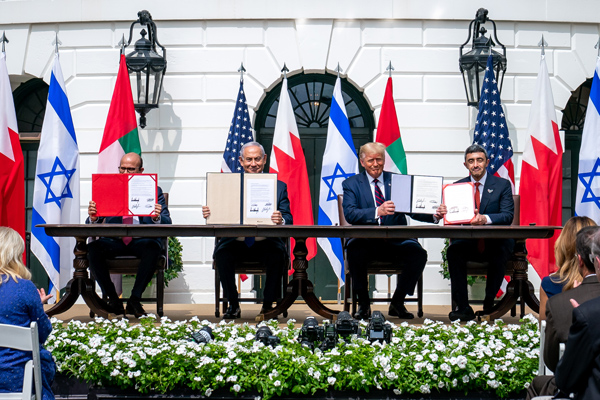
As President-elect Donald Trump prepares to return to the White House, some of his foreign policy advocates are urging him to expand one of his most significant achievements: the Abraham Accords. In a recent opinion piece for Newsweek, Joseph Epstein argued that Trump should seize the opportunity to include Azerbaijan, Kazakhstan, and Uzbekistan—three Muslim-majority, post-Soviet nations—in the accords.
The Abraham Accords, signed in 2020, normalized diplomatic relations between Israel and several Arab states, including the United Arab Emirates and Bahrain. Epstein contends that expanding these accords to Central Asia could not only bolster U.S. influence in the region but also reinforce partnerships with nations that have long embraced regional peace, religious tolerance, and strategic cooperation with Israel.
Why Central Asia?
Central Asia, a region steeped in history as the crossroads of the ancient Silk Road, is home to vast natural resources, including oil, gas, and critical minerals like uranium and lithium. The region is also geopolitically significant, positioned between global powers such as Russia, China, and Iran.
Azerbaijan, Kazakhstan, and Uzbekistan have maintained strong ties with Israel since gaining independence from the Soviet Union in 1991. These nations cooperate closely with Israel on security, agriculture, and trade, and they have remained steadfast allies during tumultuous times, including the fallout from Hamas’s Oct. 7, 2023, attacks.
Azerbaijan and Kazakhstan, in particular, have been described as Israel’s “best friends” in the Muslim world. Azerbaijan supplies Israel with 60% of its oil imports and has been a key partner in defense, while Uzbekistan has steadily increased trade ties with Israel.
The Strategic Case for Expansion
The Abraham Accords have proven to be more than just peace agreements; they serve as a platform for cooperation among Israel, the U.S., and pro-U.S. Muslim nations. Adding Azerbaijan, Kazakhstan, and Uzbekistan to the accords could further U.S. strategic goals, particularly as tensions with Russia and Iran escalate.
The Middle Corridor—a trade route bypassing Russia and Iran and connecting China to Europe—is central to U.S. interests in the region. Azerbaijan and Kazakhstan play critical roles in this corridor, making their inclusion in the Abraham Accords a strategic priority.
By aligning with these nations, Washington could help them navigate the delicate balance of maintaining ties with China and Russia while reducing dependency on these powerful neighbors. Israel’s pre-existing relationships and cultural connections with Central Asia make it a natural intermediary in fostering closer ties between the U.S. and the region.
A Stand Against Radicalism
One of the most compelling reasons to expand the Abraham Accords is the shared commitment to combatting radical Islamist ideologies. Azerbaijan, Kazakhstan, and Uzbekistan are secular states that protect religious freedom and have taken strong stances against extremism.
Over the past year, security forces in these nations have thwarted several Islamist-inspired terrorist plots, often linked to foreign actors such as Iran and the Taliban. While joining the Abraham Accords might provoke backlash from radical groups, it would also connect these nations with other experienced partners in counterterrorism, such as Israel.
Building Bridges with Washington
The three Central Asian nations have demonstrated a willingness to strengthen ties with the United States through their relationships with pro-Israel and Jewish organizations. Azerbaijani President Ilham Aliyev recently hosted leaders from the American Israel Public Affairs Committee (AIPAC) to discuss mutual interests, while Kazakhstan has worked with Jewish groups to remove trade barriers with the U.S.
For these nations, joining the Abraham Accords would offer significant benefits, including access to the U.S. market and a stronger defense against regional adversaries like Iran and Russia. For Washington, the accords would provide a pathway to deepen engagement in a critical region while promoting a vision of tolerance and cooperation among Muslim-majority nations.
Trump’s Opportunity
Joseph Epstein highlights that Trump’s pick for national security advisor, Rep. Michael Waltz, has advocated for expanding the Abraham Accords. Adding Azerbaijan, Kazakhstan, and Uzbekistan could serve as a cornerstone of Trump’s foreign policy legacy, reinforcing moderate Muslim nations, strengthening Jewish-Muslim ties, and securing U.S. influence in one of the world’s most strategic regions.
As Trump prepares to take office, the expansion of the Abraham Accords presents a unique opportunity to build on past successes while addressing the complex challenges of Central Asia. For proponents like Epstein, this initiative is a logical and necessary next step in reshaping the geopolitical landscape.